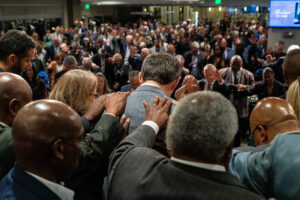
WASHINGTON (BP)–Cable customers would no longer be forced to pay for a bundle of channels but would be able to pay only for the channels they want under a proposal favored by the Federal Communications Commission.
New FCC Chairman Kevin Martin told a Senate committee Nov. 29 that such a system — called a la carte — would lower costs for consumers and would allow families to avoid paying for channels they find objectionable, USA Today reported.
The FCC previously opposed an a la carte system, saying in a 2004 report that it would lead to higher costs, USA Today said. But Martin said that report included “incorrect and incomplete analysis.”
A new FCC report concludes that purchasing cable programming in more of an a la carte manner “in fact could be economically feasible and in consumers’ best interest,” Martin said.
Under the current system, cable companies bundle channels together, so that a family often has to pay for more than 60 channels, even if they want only 10 of them. For instance, a family that wants Fox News, CNN and ESPN might also have to pay for MTV and VH1 — channels they might find offensive.
Although cable companies have in the past opposed a la carte programming, Cablevision says it supports the move.
“Cablevision agrees with FCC Chairman Kevin Martin’s assertion … that the opportunity to purchase programming on an a la carte basis would be in the best interests of consumers,” Cablevision Chairman Charles Dolan said in a statement. “Like Chairman Martin, we do not believe in the long term that selling programming a la carte will be detrimental to either programmers or cable operators. On the contrary, our experience indicates a la carte will result in a more affordable service for all with more programming options.”
Similarly, AT&T told USA Today, “We support giving customers flexibility and options.”
STUDY SAYS WINE NOT BENEFICIAL — A new study says any health benefit from wine consumption is “very small” and likely is outweighed by the risks involved in drinking alcohol, CNN.com reported Dec. 2.
Studies during the 1970s and 1980s said that “small to moderate” wine consumption might protect against coronary artery disease, the report in the medical journal The Lancet says. But those studies were based on “confused research,” according to the newer study.
“Do not assume there is a window in which the health benefits of alcohol are greater than the harms — there is probably no free lunch,” the study says, according to CNN.com.
Ironically, alcoholics are the only group where alcohol consumption can provide protection against heart attacks.
“While moderate to heavy drinking is probably coronary-protective, any benefit will be overwhelmed by the known harms,” the study says.
BOB DYLAN, THE BEATLES & DRUGS –- A new book on the Beatles, spanning nearly 1,000 pages, includes references to the Beatles’ escalating drug use during their heyday.
Reviewers Jane and Michael Stern, writing in The New York Times Book Review section, mention that Bob Spitz’s book, “The Beatles: The Biography,” tells of the Beatles’ first use of marijuana, with “Ringo meticulously rolling up towels,” as the Sterns paraphrase it, “to seal the threshold under the door of a room at the Delmonico Hotel in New York the night in 1964 when they met Bob Dylan and Dylan introduced them to marijuana.”
“An unusually gregarious Dylan was delighted by the Beatles’ curiosity and readiness to experiment,” Spitz is quoted as writing. “They got right in the groove, which relaxed the recalcitrant bard, who lit joint after joint, fanning the fateful flame.”
The Sterns note that the chapter ends with, “Nothing would ever be the same again.”
The Sterns also mention what Spitz calls the Beatles’ “course of reckless hedonism,” including, as the Sterns paraphrase it, “John’s making a deal with LSD-maker Stanley Owsley to pay for a lifetime supply of the hallucinogen. On one occasion, under its influence, they all went to the Aegean Sea to purchase a cluster of islands where they planned to build four houses connected by tunnels, with the land between the homes filled with meditation posts, painting and recording studios, a go-cart track, and a landing strip. When the acid wore off, they got bored and abandoned the idea … but bought the islands anyway.”
Barrett Duke, vice president for public policy and research with the Southern Baptist Ethics & Religious Liberty Commission, asked for comment by Baptist Press, recounted, “As one who grew up in the ’60s and ’70s, I was particularly affected by the Beatles. Their embrace of drugs and the culture it bred had a profound influence on me and most of my generation. While the Beatles were not the only reason I turned to drugs in my teen years, I think they had a lot to do with the introduction of drug use in middle-class America. They helped to glamorize the drug culture and made it appear less sinister. Tragically, I and millions of others paid the price as we followed our cultural icons into the oblivion of drugs and alcohol.
“The influence of Bob Dylan on the Beatles helped usher in a tragic period in American history,” Duke continued. “The scene was already set, but whether or not it played out was in the hands of a few powerfully influential people. While we celebrate the musical genius of the Beatles, we must lament the destructive influence drugs played in their own lives and the lives of millions who followed their lead.
“Our country is finally dragging itself out of the haze of its drug-induced cultural experiment. Sanity is beginning to take hold as a new generation, wiser and more aware of the personal and social cost of drug use, moves into leadership roles in our nation. I believe we are about to escape the ’60s, and that is fine with me.
“If it had not been for Jesus and some Southern Baptists who were willing to reach out to me,” Duke said, “I am confident that my life would have taken a much darker direction. I thank God every day for His great healing, restoring power. Imagine the difference that might have resulted for millions of people if the Beatles had set a much different example. May the Lord help Southern Baptists and all people of the faith to be positive examples of godliness to counter the ever-present siren call that still leads too many young men and women to the self-destruction of drug abuse.”
–30–















